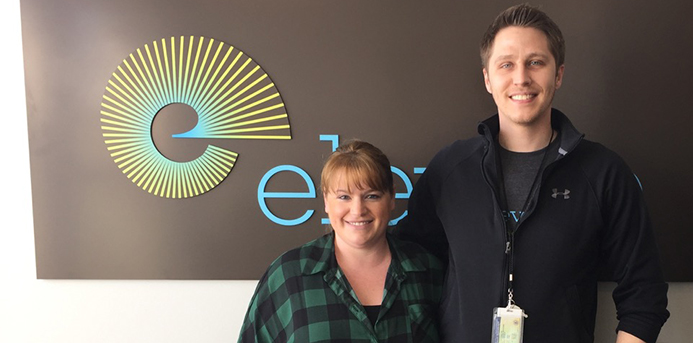Candi Pettinger, 40, has never smoked even a cigarette. Now, she credits medical cannabis, which she uses on a regular basis, with saving her life.
Diagnosed in 2002 with rheumatoid arthritis and Sjorgren’s Syndrome, Pettinger’s life hit a downward spiral three years ago when an unrelated surgery exacerbated her symptoms. The extreme pain associated with the conditions, along with the side effects of the 13 traditional medications she was taking, put her into a depression. She gained 70 pounds, had to leave her job in her family’s construction business, and even told her husband that he’d be better off with someone else. Today, thanks to almost daily use of medical cannabis, Pettinger is employed, active and relatively pain free.
“The first time I tried it, I was afraid,” Pettinger says. “It took me a long time to get up the nerve and over the stigma. But I felt like [medical cannabis] was my last chance; it was the one thing I hadn’t tried.”
Illinois now needs more patients like Pettinger, a pioneer in the state’s Compassionate Use of Medical Cannabis Pilot Program. As of early April, there were some 5,600 patients certified in Illinois to buy and use medical marijuana, compared to about 107,000 registered patients in Colorado.
So, why aren’t more patients registering for the program? Well, to start, the list of acceptable diagnoses is limited, with chronic pain and post-traumatic stress disorder notably absent from the list. But for those who do have one of 39 qualifying conditions — Crohn’s disease, cancer and multiple sclerosis, to name a few — the biggest impediment might be more complicated. A lingering stigma associated with marijuana use, a time-consuming application process, and the state’s lack of a public education and awareness campaign, have all contributed to the shortfall, experts say.
“The program has taken off, just more slowly than expected,” says Dina Rollman, founding partner of Rollman & Dahlin LLP, a Chicago law firm that specializes in cannabis law and business litigation. “I hope that the laws evolve so more patients can get access to cannabis as a treatment option.”
Let’s clear up a common misconception. Patients do not need a physician’s prescription to get medical cannabis. Instead, a physician completes a form indicating that a patient indeed has one of the qualifying conditions. If a patient’s physician is weary about doing so, the Medical Cannabis Outreach organization can help find physicians who support the use of medical marijuana and will help guide the patient in attaining a Medical Cannabis Patient Registry Card. To complete the application process, patients must also provide proof of address, electronic fingerprints, and a payment of $100.
As medical cannabis use becomes more prevalent, more research likely will be done to provide data that could boost comfort levels and acceptance among physicians and patients. In fact, just recently Ann & Robert H. Lurie Children’s Hospital of Chicago released a study touting the reduction in seizures in epileptic children who received medical cannabis. The pediatric patients receive little to none of the psychoactive component THC in marijuana that typically gets people high. Instead, the children receive medicine with a higher concentration of CBD, a non-psychoactive compound in marijuana.
Most dispensaries have on-staff counselors who work with patients to determine the appropriate strain of medical cannabis. Paul Nowacki, 30, is the assistant general manager and patient care representative at Elevele (1460 Old Skokie Road, Highland Park, 847-780-3942) and studied through a research project in college the therapeutic benefits of cannabis. While there is no formal certification process for patient-care counselors, Nowacki has spent time traveling to Colorado to learn everything he can about product development and medical benefits.
“Depending on a patient’s previous usage of cannabis, I custom-tailor it,” Nowacki says. “I start on the lighter side. I want to make sure the patient doesn’t take too much and get scared away from it. We keep adjusting the dosage and monitoring the effects.”
For those patients who are ready to become users, Chicago and suburban residents now have access to a number of dispensaries across Chicagoland, including Elevele in Highland Park, The Clinic Mundelein (1325 Armour Blvd., Mundelein, 847-616-8966) Greenhouse (151 S. Pfingsten Road Unit V, Deerfield, 847-686-2821); PharmaCannis Health & Wellness (1804 Maple Ave., Evanston, 847-424-0140); MOCA | Modern Cannabis (2847 W. Fullerton Ave., Chicago, 872-829-2089 ) and Dispensary 33 (5001 N. Clark St., Chicago, 312-620-3333). Patients can take comfort in knowing there are strict requirements as to how the product is grown, packaged, labeled, tested and transported. All the dispensaries approved by the state of Illinois source their cannabis from 18 highly regulated cultivation centers in Illinois.
Even though Pettinger received her certification from a physician at The Healing Clinic in Chicago, she has been transparent with all the providers on her medical team about her medical cannabis use. She credits medical cannabis not only with relieving her pain, but with sparing her side effects such as headaches and nausea that she had from her traditional medications.
With cannabis “it’s all relief,” Pettinger says. “I started seeing benefits right away and I feel like I can cope with life. It’s made a world of difference.”
More from Make It Better:

